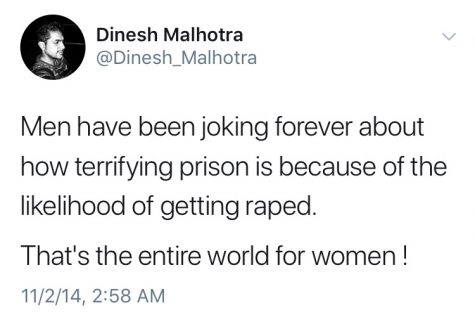Sexual Assault and Everyday Culture

December 14, 2018
Disclaimer: This article is the third of three articles that have all been about sexual assault in everyday life. All of the statistics and arguments are not in this article, nor is my opinion the same as that of all feminists. This article also does not focus much on men and their potential to be victims; mostly because of the lack of data and the lower likelihood, but not because their stories and experiences are invalid.
If you were to Google “strategies to prevent assault,” you would find 21,000,000 results, all almost exclusively directed towards women, that talk about how to avoid being assaulted by men.
Tips include, “don’t be afraid… to hurt someone’s feelings,” and to vary jogging routes if you exercise, because “predictability is risky,” according to the second result.
Women are afraid of men, and there is nothing that we, as women, can do about it. It is not an unreasonable fear; 1 in 3 women have been violently sexually assaulted.

Men may be afraid to date because of the MeToo movement, but women have always been afraid of dating.
Statistically, you know more women who have been raped than people who can’t eat gluten. More than 90% of women who have been raped were raped by someone that they already knew, and more than 50% of those people they were already in a relationship with. Many women do not trust men because they feel as though they cannot afford to.
Obviously, not every man is a rapist; no educated woman who is advocating against rape or for feminism believes that they are. But many women have had traumatic, violent experiences involving men and even more have heard stories from their friends, mothers, and aunts.
From the age of ten, I have been nervous around certain men. At the age of eleven, I somehow accrued the knowledge that you can use keys as an effective weapon if you hold them the right way. I genuinely don’t know how either of those ideas were planted in my head, and yet there they were.
Considering these deep seated fears in much of the female population, you would think that talking about rape would be taken seriously and considered within the scope of the victim’s experience. Yet it is not. There are hundreds of jokes about victims across the internet, and those jokes come up in everyday conversations in school, workplaces, or even at home. Some men in the room may laugh, and some women may laugh too, but is it worth the one girl in the room who from now on will never be able to fully trust your intentions?
One in nine girls under 18 experience sexual abuse or assault, and women from the ages of 16 to 19 are four times more likely than the general population to be victims.
According to a study published in The New York Times about male rapists, the main issue is apparently a lack of empathy. They don’t understand, or they refuse to consider the woman’s point of view.
This may partially be due to the way women are described to men when they are younger, or the way that pop-culture perpetuates the idea that women don’t say, or know, what they want.
A good example of this is the song “Blurred Lines” by Robin Thicke, which was No. 1 in 25 countries, and was the No. 1 song of 2013 in several of them. Lyrics in this song include words like, “You’re a good girl/ Can’t let it get past me/ You’re far from plastic/ Talk about getting blasted/ I hate these blurred lines/ I know you want it”
An opposing song, which is much less well known, is Dessa’s song “Fire Drills.” One of the verses includes, “I think a woman’s worth/ I think that she deserves/ A better line of work/ Than motherf***ing vigilance/ Don’t give me vigilance.”
Culture isn’t changing fast, but it is changing. Empathy is becoming something people strive for, and women are coming forward when they are mistreated. There are many instances when that goes badly, still, but sometimes their statements are effective.
These are some articles from other sources that talk about why women are still afraid in the current culture in the U.S., and why many still don’t come forward.
A Policeman raping a woman after she went to the police to report a rape;
https://nypost.com/2018/05/10/detective-offered-to-drive-rape-victim-home-but-demanded-sex-instead-cops/
Cases of Police raping women;
https://www.cnn.com/2018/10/19/us/police-sexual-assaults-maryland-scope/index.html
Why rape allegations don’t ruin most men’s lives; https://hellogiggles.com/news/no-sexual-assault-allegations-dont-usually-ruin-mens-lives/
How reporting rape can ruin women’s lives; https://www.theguardian.com/world/2017/nov/21/women-sexual-harassment-work-careers-harvey-weinstein
